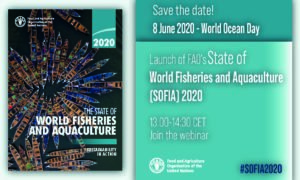COVID-19 has affected the fishing and aquaculture food supply chains like no other shock before, according to an addendum to the recently launched Food and Agriculture Organization (FAO)’s SOFIA 2020 report.
“The protection measures taken by governments to contain the spread of the disease, while necessary, have impacted each step of the seafood supply chain, from fishing and aquaculture production to processing, transport, wholesale and retail marketing,” it said.
The addendum also claims that global fishing activity may have declined by around 6.5% and that more than 90% of small-scale fishers in the Mediterranean and Black Seas were forced to stop due to an inability to sell their catches — often exacerbated by falling prices — as a result of restrictions and labor shortages due to COVID-19.
On a webinar held by the organization on June 8, FAO’s director-general Qu Dongyu confirmed those findings and said the pandemic has also shown the need for accelerated efforts “to achieve sustainability at all levels, where fishery management is critically important”.
“This is the only way to achieve sustainability,” he added. “The pandemic has also highlighted that both fisheries and aquaculture value chains are extremely vulnerable, especially in developing countries.”
The profound socio-economic consequences of this pandemic will make FAO’s fight to defeat hunger and poverty harder and more challenging, according to the organization. “The outbreak of the disease has also negatively impacted trade among key exporters and importers in 2020,” it said.
COVID-19 affected both fisheries and aquaculture sectors, mainly because of their dependence on foodservice distribution channels. Hotel and restaurant activity has been significantly reduced due to the measures taken by countries and organizations throughout the world to contain the spread of the virus.
The disruption of international transport has also impacted aquaculture production for export in particular, as stated in the addendum.
According to the director of the FAO’s fisheries and aquaculture policy and resources division, Manuel Barange, “there has been a reduction of fishing and aquaculture activities but also of processing, distributing and researching, due to the inability to keep physical distancing on boats, markets and factories, in the first place”.
“Export markets have been largely closed, except for frozen, marinated, smoked and canned fish, which have remained stable or seen growth during the lockdown,” he added.
“However, one of the sectors that suffered the consequences of COVID-19 the most has been the informal economy sector, whose value chains cannot cope with cash flow issues and have limited social support systems. Those are the ones the FAO is trying to support the most now.”
The FAO is currently working together with some partners’ proposals to help those sectors that have been profoundly affected and, in particular, to revitalize their value chains. “Revitalizing our sectors’ value chains after COVID-19 is a very relevant matter,” he said.


